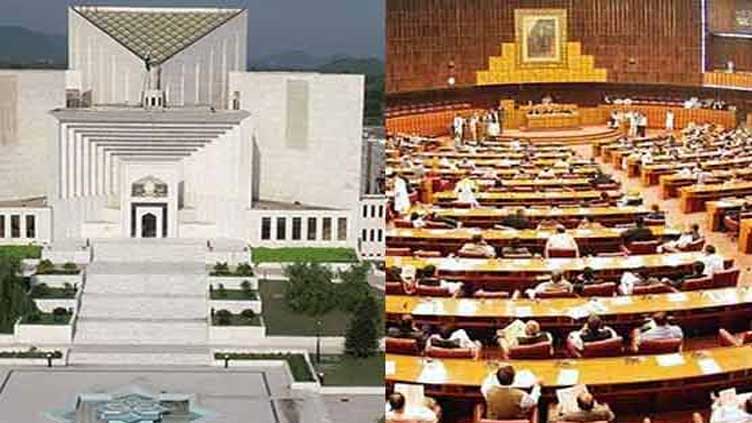By Naveed Naqvi
ISLAMABAD: The coalition government of Prime Minister Shehbaz Sharif on Tuesday introduced a bill in Parliament to curtail the discretionary powers of the chief justice to form a bench of his choice or to take suo motu notices.
Law minister Azam Nazeer Tarar presented ‘The Supreme Court (Practice and Procedure) Act, 2023’ in the Parliament.
The move followed after two Supreme Court judges questioned the suo motu powers of the country’s top judge.
Minister Tarar said the bill prepared by the ministry of law and justice was deliberated by the cabinet and after its approval it was presented before Parliament.
The bill proposes that the three senior-most judges of the Supreme Court will decide on their own notice. It proposes to give the right to file an appeal within 30 days against the decision of the suo motu notice.
According to the bill, the appeal must be fixed for hearing within 14 days of filing.
“..If the Committee is of the view that a question of public importance with reference to enforcement of any of the fundamental rights conferred by Chapter I of Part II of the Constitution is involved, it shall constitute a bench comprising not less than three judges of the Supreme Court of Pakistan which may also include the members of the Committee, for adjudication of the matter,” it adds.
The legislation also allows appeals within 30 days of a verdict being issued on a suo motu case and enforces that a bench be constituted to hear such an appeal within 14 days.
“An appeal shall lie within thirty days from a final order of a bench of the Supreme Court who exercised jurisdiction under clause (3) of Article 184 of the Constitution to a larger bench of the Supreme Court and such appeal shall, for hearing, be fixed within a period not exceeding fourteen days,” according to the proposed bill.
Tarar said the bill ensures that “every cause, appeal or matter before the Supreme Court shall be heard and disposed of by a bench constituted by the Committee comprising the Chief Justice of Pakistan and two senior-most judges, in order of seniority” and the decisions of such a committee shall be by majority.
“There were also periods when the Supreme Court took three to four suo motu notices in a day on administrative matters. If you look at history then many important national assets were denationalised and privatised … but all those matters were reversed by Article 184(3) proceedings, the results of which are before us.”
Later the Parliament sent the bill to a committee to discuss it and report back before voting.
Former prime minister Imran Khan termed the government move an attack on the judiciary.
“They are the ones who bribe the judges, threaten them and put pressure on them… Don’t expect that people will be scared by these acts.”
Prime Minister Sharif talked at length about the dissenting judgement by Justice Mansoor Ali Shah and Justice Jamal Khan Mandokhail of the apex court, who lashed out at the unlimited authority of the chief justice to take a suo motu action on any issue and constitute benches of choice to hear different cases.
Their judgment was about the case of suo motu notice taken by Chief Justice Umar Ata Bandial on February 22 about elections in Punjab and Khyber Pakhtunkhwa provinces.
Sharif, addressing the joint session of parliament, said if the legislation were not passed, “history would not forgive us”.
The premier also said that the courts were treating PTI chief Imran Khan favourably and were not ready to hold Khan accountable.
Sharif said “enough is enough” and the law would take its course while the government would not allow “the favourite” to play with Pakistan.
He said the Constitution clearly defined the division of powers between the legislature, judiciary and administration and set a red line that no one should cross.
“The powers of the legislature defined by the Constitution and the powers of the judiciary were being flouted.”
Legal experts were sharply divided on the government’s move.
Barrister Asad Rahim Khan said the government’s legislation was a “clownish attempt to declaw the one institution standing in the way of the Constitution’s violation”.
“It can’t be done through ordinary legislation, and it attacks both the independence of the judiciary as well as the principle of trichotomy of powers.”
Senior lawyer Salahuddin Ahmed termed the amendments as “excellent and much-needed” and the proposed changes were in line with what all the bar associations had been demanding.
Copyright © 2021 Independent Pakistan | All rights reserved




